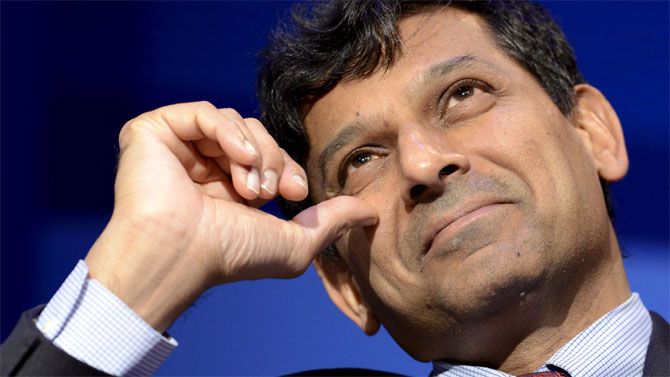Reserve Bank of India (RBI) Governor Raghuram Rajan spoke on a host of issues at his last post-policy interaction with the media. Excerpts:

On liquidity:
Rajan: The liquidity deficit calculation is more complicated because we have to take into account what component of our dividend payment to the government is based on income generated domestically versus income generated internationally.
That also factors in the permanent liquidity calculation. Broadly, we were at a deficit of one per cent of NDTL (net demand and time liabilities) and are moving to eliminate that over time. We are probably about 40 per cent of the way at this time.
Remember, there are seasonalities. June-July is the time when cash comes back from the system and, as a result, there tends to be excess liquidity at points like these. The government has also spent quite a bit; tax revenues haven't come back. So, the point is not to look at this as a balance because this will dissipate over time as tax collections come in. The point is to have neutrality over the entire year.
Urjit Patel, Deputy Governor: When it was announced in April that we will eliminate the structural deficit, we had not given a timeline. The reason for that is there are a fair number of transitory issues also taking place.
At the back of our mind, it is a one to two-year programme and I think we need that flexibility for the variety of reasons that you (Rajan) mentioned.
We have to make it congruent with the stance of monetary policy. It is not an unconstrained decision that was taken. We want to eliminate the deficit and we will calibrate it in the least disruptive and most beneficial manner.
On non-performing assets (NPAs):

Rajan: Broadly speaking, we are comfortable with the recognition process - banks have certainly taken a lot of steps. The culture of cleaning up seems well-embedded, as well as a culture of recovery on the loans. What remains is for some of these large stressed projects to figure a way to restructure, in a way that makes sense for the longer term health of the system and the health of the project.
The attitude towards these schemes is also changing. Earlier, the attitude was, this is a way to postpone recognition (that the asset is stressed). That is no longer there. Now, the question is this a way to effect resolution.
At this point, banks have enough tools. The real issue is to use these. We are working with them to make sure that any impediments are rectified.
S S Mundra, Deputy Governor: Overall, there is no significant elevation in the percentage of stressed assets. In the pace of generation of new NPAs, there is a clear deceleration. That is what would be the road map. Of course, the provisioning requirement would continue to enhance.
The overall movement of banks towards that direction is getting more sure-footed, if not any definite resolution on the cards. The clarity is much greater than what it it was when we embarked on this path.
On GST:
Rajan: On whether there is a time before (GST takes effect) which it will become impossible to do a rate cut, I don't think one can argue in such a way. A rate cut is done taking into account the time path of inflation. It is not wise to assume GST implementation will necessarily increase inflation.
Whatever inflation that happens, whether it is long-time or short-time, is something to think about. It could be a one-time adjustment of prices, even if there is inflation.
On transmission by banks of RBI rate changes:

Rajan: We would be happier if there was more transmission. I understand some of the difficulties the banks have and my sense is that as this process of clean-up happens and as the economy recovers and credit demand also picks up, you will see more possibility of transmission.
On new reforms:
Rajan: In the next few weeks, we plan to announce guidelines for P2P lending (peer to peer, lending money to individuals or businesses through online services that match lenders directly with borrowers) and for account aggregators.
On August 25, we will unveil a set of measures to improve the functioning of markets, especially the corporate bond markets. Some of these measures will build on suggestions in the recent Khan committee report.






